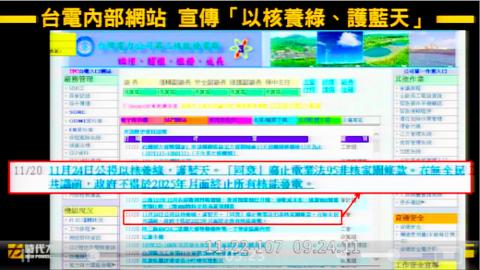An internal Web site of state-run Taiwan Power Co (Taipower, 台電) has posted a notice urging employees to support a referendum to cancel a government policy to phase out nuclear power, apparently breaching laws on government neutrality, New Power Party Executive Chairman Huang Kuo-chang (黃國昌) said yesterday.
In a question-and-answer session at a meeting of the Legislative Yuan’s Judiciary and Organic Laws and Statutes Committee, Vice Minister of Civil Service Tsai Hsiu-chuan (蔡秀涓) confirmed that such posts should be illegal and said that she would look into the matter.
Huang said the post, which was on an employees-only Web site of the Ma-anshan Nuclear Power Plant in Ma-anshan (馬鞍山), Pingtung County, was entitled: “The Nov. 24 referendum to keep nuclear power, allowing the nation to develop clean energy and keeping the sky clear.”

Photo: Copy by Hsieh Chun-lin, Taipei Times
The referendum, one of 10 to be held tomorrow alongside the nine-in-one local elections, asks voters whether they agree to scrap Article 95, Paragraph 1 of the Electricity Act (電業法), which stipulates that all nuclear power plants in the nation must cease operations by 2025.
“Agree to scrap the ‘nuclear-power free homeland’ clause in Article 95 of the Electricity Act. The government should not shut down all nuclear power plants by 2025 before members of the public reach a consensus on the matter,” read a screenshot of the post provided by Huang.
According to Article 10 of the Civil Service Administrative Neutrality Act (公務人員行政中立法), civil servants cannot use any power, means or opportunity obtained through their position to ask people to vote in a certain way or to not vote in elections or referendums, Huang said.
“Is it legal to make a post on a Web site saying who should be voted Taipei mayor or New Taipei City mayor? The answer is, of course, no. Is that not the same with referendums?” he said, adding that the Web site is a public resource.
Tsai initially said that she was unfamiliar with related laws, but later agreed that such posts should be illegal, adding that she would have to look into the details.
Following the meeting, Taipower said that the post was made by union members and that it had already been removed.
Taipower respects every employee’s opinions on the referendum, but posting them on company Web sites is “inappropriate,” company spokesman Hsu Tsao-hua (徐造華) said.
Taipower has 27,000 employees and many different unions, he said, adding that the post was made by a union related to nuclear energy departments and does not represent the company’s view.
Taipower has enhanced employee education to ensure that they follow principles of administrative neutrality and refrain from promoting or discussing referendums on public platforms, he added.
Additional reporting by Lin Ching-hua

The US government has signed defense cooperation agreements with Japan and the Philippines to boost the deterrence capabilities of countries in the first island chain, a report by the National Security Bureau (NSB) showed. The main countries on the first island chain include the two nations and Taiwan. The bureau is to present the report at a meeting of the legislature’s Foreign Affairs and National Defense Committee tomorrow. The US military has deployed Typhon missile systems to Japan’s Yamaguchi Prefecture and Zambales province in the Philippines during their joint military exercises. It has also installed NMESIS anti-ship systems in Japan’s Okinawa

‘WIN-WIN’: The Philippines, and central and eastern European countries are important potential drone cooperation partners, Minister of Foreign Affairs Lin Chia-lung said Minister of Foreign Affairs Lin Chia-lung (林佳龍) in an interview published yesterday confirmed that there are joint ventures between Taiwan and Poland in the drone industry. Lin made the remark in an exclusive interview with the Chinese-language Liberty Times (the Taipei Times’ sister paper). The government-backed Taiwan Excellence Drone International Business Opportunities Alliance and the Polish Chamber of Unmanned Systems on Wednesday last week signed a memorandum of understanding in Poland to develop a “non-China” supply chain for drones and work together on key technologies. Asked if Taiwan prioritized Poland among central and eastern European countries in drone collaboration, Lin

BACK TO WORK? Prosecutors said they are considering filing an appeal, while the Hsinchu City Government said it has applied for Ann Kao’s reinstatement as mayor The High Court yesterday found suspended Hsinchu mayor Ann Kao (高虹安) not guilty of embezzling assistant fees, reducing her sentence to six months in prison commutable to a fine from seven years and four months. The verdict acquitted Kao of the corruption charge, but found her guilty of causing a public official to commit document forgery. The High Prosecutors’ Office said it is reviewing the ruling and considering whether to file an appeal. The Taipei District Court in July last year sentenced Kao to seven years and four months in prison, along with a four-year deprivation of civil rights, for contravening the Anti-Corruption

NO CONFIDENCE MOTION? The premier said that being toppled by the legislature for defending the Constitution would be a democratic badge of honor for him Premier Cho Jung-tai (卓榮泰) yesterday announced that the Cabinet would not countersign the amendments to the local revenue-sharing law passed by the Legislative Yuan last month. Cho said the decision not to countersign the amendments to the Act Governing the Allocation of Government Revenues and Expenditures (財政收支劃分法) was made in accordance with the Constitution. “The decision aims to safeguard our Constitution,” he said. The Constitution stipulates the president shall, in accordance with law, promulgate laws and issue mandates with the countersignature of the head of the Executive Yuan, or with the countersignatures of both the head of the Executive Yuan and ministers or